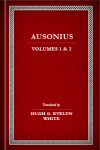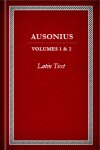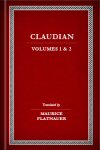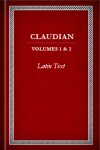Latin Poets of Late Antiquity (8 vols.)
Digital Logos Edition
Overview
Latin Poets of Late Antiquity brings you two well-known Latin poets: Ausonius and Claudian. Ausonius was highly praised by his contemporaries—some of whom were his former students—and adored by fourth century critics. His most famous poem, Mosella, was equated with the works of Virgil. Today, his works offer a glimpse into the popular poetic modes and styles of his time, in an easily readable sample of Latin literature. Ausonius developed a reputation as a skilled teacher, drawing many pupils and eventually becoming the tutor of emperor Valentian I’s son, Gratian. For his exceptional service, Valentinian bestowed on him the title of quaestor, and when Gratian became emperor in 375, he awarded Ausonius the highest honors, including praetorian prefect of Gaul, and eventually consulate—the highest Roman honor. After Gratian was assassinated in 383, Ausonius withdrew to live a quiet life at his estate, focusing on his writing and poetry.
Despite Greek being his native tongue, Claudian was the last known Latin poet of classical Rome, and one of the greatest Latin poets of late antiquity. He was a court poet for Emperor Honorius, so many of his works were politically oriented, praising his patrons and attacking their adversaries. His elegant writing and skill in storytelling in some cases resulted in unmatched polemic poetry. However, Claudian’s reputation as a poet wasn’t solely based on his political work. His unfinished epic, De raptu Proserpinae, influenced poets and painters for hundreds of years after his death.
This collection contains the complete texts in their Loeb Classical Library editions. Each volume is included in its original Latin with an English translation for easy side-by-side comparison. Logos’ language tools help you to go deeper into the Latin text and explore each poet’s elegant language. Use the dictionary lookup tool to examine difficult Latin words and find every appearance of the same word in your library. There’s never been a better way for students of history, culture, and Latin literature to absorb these works.

Key Features
- Loeb Classical Library editions
- Works by two of the last great Latin poets
- Unrivaled polemic poetry
Product Details
- Title: Latin Poets of Late Antiquity
- Authors: Ausonius and Claudian
- Translators: Hugh G. Evelyn White and Maurice Platnauer
- Series: Loeb Classical Library
- Publisher: G. P. Putnam’s Sons and Harvard University Press
- Volumes: 8
- Pages: 1,570
Individual Titles

This volume contains Hugh Evelyn White’s English translation of books 1–17 of Ausonius’ works, including his most famous poem, Mosella.

This volume contains the Latin text of books 1–17 of Ausonius’ works, including his most famous poem, Mosella.

This volume contains Maurice Platnauer’s English translation of Claudian’s political poetry.
Contents:
- Panegyric on the Consuls Probinus and Olybrius
- The First Book against Rufinus
- The Second Book against Rufinus
- The War against Gildo
- Against Eutropius
- Fescennine Verses in Honour of the Marriage of the Emperor Honorius
- Epithalamium of Honorius and Maria
- Panegyric on the Third Consulship of the Emperor Honorius
- Panegyric on the Fourth Consulship of the Emperor Honorius
- Panegyric on the Consulship of Fl. Manlius Theodorus
- On Stilicho’s Consulship

This volume contains the Latin text of Claudian’s political poetry.
Contents:
- Panegyric on the Consuls Probinus and Olybrius
- The First Book against Rufinus
- The Second Book against Rufinus
- The War against Gildo
- Against Eutropius
- Fescennine Verses in Honour of the Marriage of the Emperor Honorius
- Epithalamium of Honorius and Maria
- Panegyric on the Third Consulship of the Emperor Honorius
- Panegyric on the Fourth Consulship of the Emperor Honorius
- Panegyric on the Consulship of Fl. Manlius Theodorus
- On Stilicho’s Consulship
This title is included in the following collections
You can save when you purchase this product as part of a collection.
Loeb Classical Library Builder...
$1,269.18$508.99Classic Catholic Scholarship C...
$3,413.99$3,413.99Classic Scholarship Collection...
$12,102.39$7,299.99
About the Authors
Decimius Magnus Ausonius (ca. AD 310–395) was a Latin poet and rhetoric teacher in France. He tutored Emperor Gratian before he came to power, and for his services Gratian granted him the consulship. His poetry was highly popular during his lifetime and remains a prime example of the poetic taste of Rome’s late history. When Gratian was assassinated in a revolt, Ausonius stayed in his country estates to write until his death.
Claudius Claudianus (ca. AD 370–404) was a Latin poet in the court of Emperor Honorius. He primarily wrote poems for Honorius, poems for General Stilicho, and mythological epic poetry. His poetic prowess earned him the rank of vir illustris, a statue in his honor, and a wealthy wife.
Reviews
1 rating

Marco Ceccarelli
11/1/2018
These resources don't have "multiple resources display" ... very annoying
Allen Bingham
2/27/2015